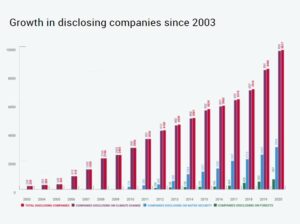Nottingham makes the ‘A List’: how the city is tackling climate change
Last week, the Carbon Disclosure Project (CDP) unveiled its list of 95 cities that are leading the way in tackling climate change. Nottingham is one of 11 UK ‘A List’ cities included.
An A List city must be disclosing a city-wide emissions inventory (detailing their carbon emissions), have a target to reduce said emissions and a published climate action plan. They must be demonstrating plans for tackling the effects of climate change, while also progressing toward lofty, yet achievable development goals.
This year, 965 cities were scored by the CDP, which almost doubled the figure (591) from 2020; as of this year, over 1,000 cities are now reporting their environmental impact.

Companies disclosing data with the CDP have, generally, trended upward.
The Carbon Disclosure Project, founded in 2000, is a non-profit organisation that ‘runs the global disclosure system for investors, companies, cities, states and regions to manage their environmental impacts. The world’s economy looks to CDP as the gold standard of environmental reporting with the richest and most comprehensive dataset on corporate and city action.’
It is a worldwide initiative, encouraging businesses and cities alike to disclose their data and engage in the effort to combat climate change. The CDP argues that disclosing environmental data helps cities evaluate their performance, identify areas of opportunity, and ultimately help build a sustainable economy and society.
Nottingham also made the list in 2020, when there were 88 cities that earned the honour. This year, with the list growing to 95, nearly half (46) of the cities named by the CDP are new entries.
That there is such a turnover suggests the importance of a consistent, coherent approach to effectively plan and develop a sustainable city.
How is Nottingham achieving this?
The city has made commitments to achieving carbon neutrality by 2028. In its Carbon Neutral Nottingham Action Plan, the council lays out four sections that make up its framework for achieving this:

Reducing carbon emissions is at the heart of plans to develop sustainable cities.
- Carbon Reduction Measures (Transport, Built Environment, Energy, Waste & Water, Consumption)
- Carbon Removal (Carbon capture, carbon offsetting)
- Resilience and Adaption (actions against climate change phenomena- flooding, extreme temperatures)
- Ecology & Biodiversity (mitigation strategies through developing and maintaining biodiversity)
The bulk of the 60-page document is dedicated to outlining carbon reduction measures within which transport, for example, is hoped will become cheaper; there are also aims for implementing more vehicle-free spaces, something to encourage more cycling and walking. Another benefit of this proposal is the improvement to air quality, addressing pollution, which has been linked to several health complications- recently, an increased mortality rate from COVID-19. The transportation sector is one of the largest emitters of greenhouse gases, and thus is considered vitally important to address.
The council is also focused on reducing carbon emissions from constructing and occupying buildings. If you read our recent blog about fuel poverty and the work of our Green Doctor service, you already know that energy-inefficient building and heating practices can have catastrophic effects. Aside from leading to debt and health complications, inefficient heating and poor construction standards cost a lot of money. The result is an excess in carbon emissions.
Among the council’s objectives is increasing the adoption of energy-efficient technologies and low-cost solutions, both commercially and domestically, to help supplant the old, wasteful implementations still in use.

Milan, Italy.
A recent report by Economist Impact found that almost 50% of emissions reductions needed by 2050 will come from technologies that are still being developed.
By decarbonising, Nottingham is part of a global movement that will continue to drive innovation; the climate crisis may seem like an enormous challenge, but it is not without its potential rewards. Municipalities across the world are adopting new and inventive ways to make their cities greener, which also has the added benefit of making them prettier and more colourful.
Cities are at the vanguard of tackling climate change, as they aim to reverse the effects of a problem they helped create. With increasing urbanisation, and already over half the world’s population living in cities, it is imperative that cities act now before it is too late.
As great as it is to see Nottingham is on the right path, we must not forget that this is a global effort built by local solutions.
4.2 billion people live in cities worldwide, and only 108 million live in an A List city. There is still a lot of work to be done.
Matthew Thomas
matthew.thomas@groundworknottingham.org.uk
